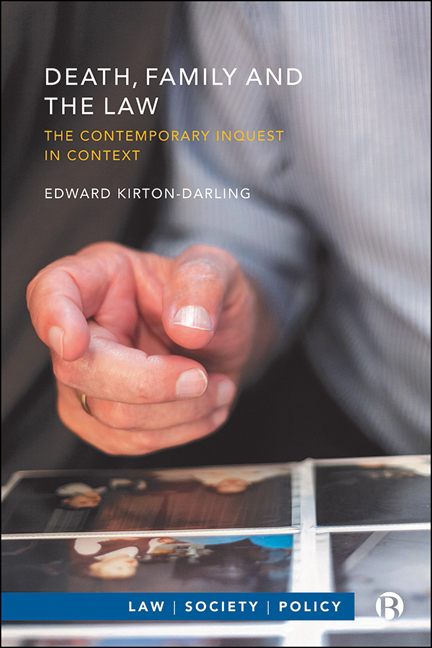Book contents
- Frontmatter
- Contents
- Acknowledgements
- Series Editor’s Preface
- 1 Death, Family and the Law
- 2 Accountability and Authority in the Historical Jurisdiction
- 3 Accountability Reconceived
- 4 First Contact and the Next of Kin
- 5 Dignity, the Family and the Body
- 6 Family in the Driving Seat
- 7 The Public(?) Hearing
- 8 Reimagining the Inquest
- Bibliography
- Index
8 - Reimagining the Inquest
Published online by Cambridge University Press: 08 October 2022
- Frontmatter
- Contents
- Acknowledgements
- Series Editor’s Preface
- 1 Death, Family and the Law
- 2 Accountability and Authority in the Historical Jurisdiction
- 3 Accountability Reconceived
- 4 First Contact and the Next of Kin
- 5 Dignity, the Family and the Body
- 6 Family in the Driving Seat
- 7 The Public(?) Hearing
- 8 Reimagining the Inquest
- Bibliography
- Index
Summary
Introduction
The key conceptual link between the theoretical resources in which I have drawn in my analysis – jurisdiction, systemic decision making, kinship and family – is the ways in which they are continually constituted and reconstituted through practices. I have argued that the inquest can be conceptualized through these practices as a process of accountability – of communicating the circumstances of death, where the circumstances of death are revealed and explained, and justifications are explored. However, the current system can be characterized as containing two competing perspectives: an understanding of the role of the Coroner and inquest, and the family within that process, as limited, serving a neutral expert accounting for death, and an emergent framing in which the participation of those connected to the deceased is conceived as essential to a meaningful accounting. The distinction lies in different representations of the law and different understandings of who participates in the development of that communication, how they participate and what the process produces. Family have to be involved, but this can be understood – as the former Chief Coroner suggested – as part of a system in which they listen to a medico-legal explanation for death or as a process in which the bereaved participate in the production of that explanation. In relation to either, it is a critical conceptual development. Where Prior (1989) argues that the inquest individualizes death, I suggest that the current system is represented as a forum which re-affirms, refashions and reveals interconnectedness, acknowledging the ways in which we are ‘socially constituted bodies, attached to others [and] at risk of losing those attachments’ (Butler 2006, 20). In this context, who is permitted to enter and is recognized as grieving is of vital importance (McIntosh 2016).
This role for the bereaved reveals a potential recalibration of the politics of death, in a shift in which kinship, connection and context is represented and understood as central to state responses to death. It is not inevitable, and the role for family can be sharply contested, in a system which, as evidence has shown,1 can shut the bereaved out and focus solely on technocratic forms of accountability (see, for example, Aitken 2021) or exclude kin through a narrow interpretation of ‘family’.
- Type
- Chapter
- Information
- Death, Family and the LawThe Contemporary Inquest in Context, pp. 176 - 184Publisher: Bristol University PressPrint publication year: 2022

